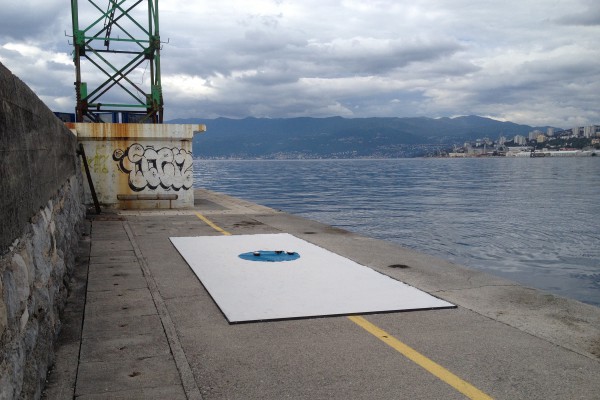
circulation #0002
2014
Zooming Fluid States Festival, Rijeka, Croatia, 7-9 September 2014.
Set against the historic backdrop of emergent capitalism and wealth creation through domination of the Adriatic salt trade, Fluid States cluster representatives brought one kilogram of their local region’s salt to an installation of Adriatic seasalt on the end of the Rijeka breakwater in the Adriatic Sea. After a series of one-on-one encounters to exchange salts, all joined at dusk to return salt to seawater.
The Circulations series employ salt to activate encounters in the dynamic inter-relationships of globality and locality. Salt is a ubiquitous form of matter; material in the hydrological cycle that is essential to life and a potential cause of breakdown of living systems; substance of historically significant social and economic exchange, whose cultural usage gave rise to food preservation and sedentary lifestyles. Salt is a material in cyclical movement and transformation – through bodies of water, through the bodies of humans and living organisms, through land – that elicits awareness of the porosity of entities and raises questions of equilibrium and change. The Circulations series draw upon regional resonances of salt: the historical emergence of mercantile practices and wealth through dominating salt trade in the Adriatic; the loss to local economy with the closure of foreign-owned salt pans on Long Island Bahamas; the oceanic imaginary in the Pacific islands; the post-tsunami consequences of seawater flooding agricultural lands in northern Japan and the symbolism of spiritual purification through salt; the rising salinity of lands in SE Australia exacerbated by excessive agricultural irrigation practices and the cultural investment in seawater de-salination infrastructure technologies to meet metropolitan Melbourne’s water demands. Our attention is directed to the range of human negotiations with natural systems and resources – commonly containing and capitalising – whilst circulations of salt continue to exceed control.